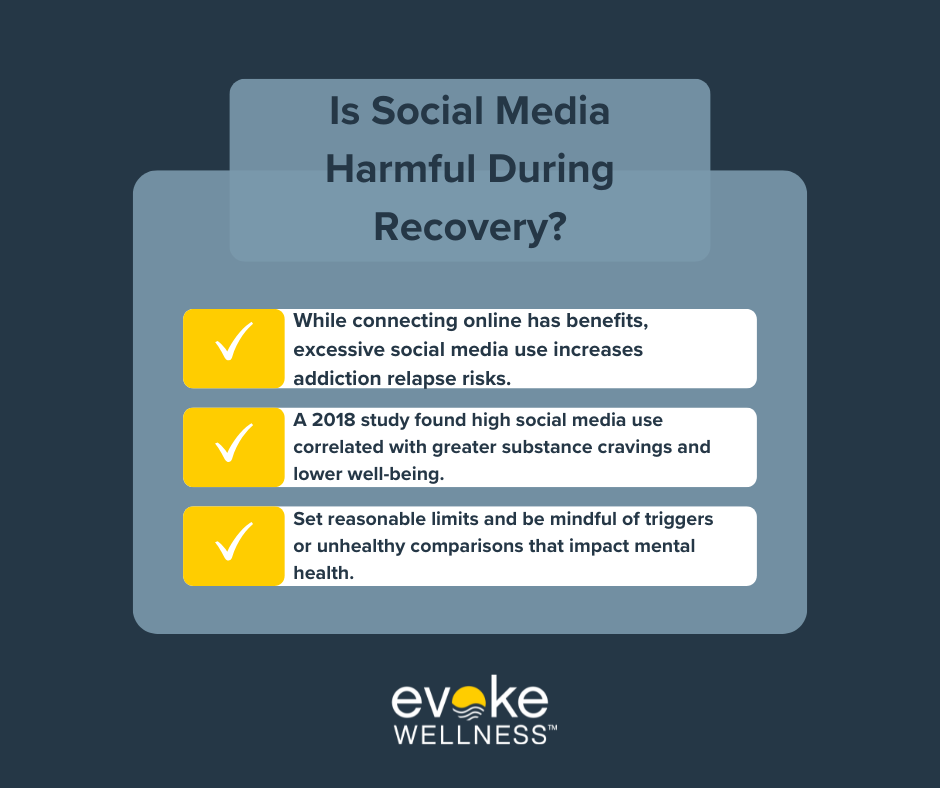In today’s digital age, technology and social media have become integral parts of our daily lives. For those in addiction recovery, these tools present both opportunities and challenges. Recent studies show that 85% of treatment centers now incorporate technology into their programs, while 67% of patients report using recovery apps. As you navigate your journey to sobriety, understanding how technology impacts the recovery process is crucial. This article examines the double-edged sword of digital tools in addiction treatment, exploring how they can both support and hinder your progress. By the end, you’ll have a clearer picture of how to harness technology’s potential while avoiding its pitfalls in your recovery journey.
If you or a loved one is struggling, help is available today. Call (833) 969-3318 to speak with our compassionate team, or reach out online and schedule an appointment to begin a healing journey.
The Growing Impact of Technology and Social Media on Addiction
Constant Digital Connection
- Always being “plugged in” can trigger addictive behaviors and enable substance abuse.
- Easy access to online communities reinforces addictive patterns.
- 24/7 connectivity makes avoiding triggers and maintaining sobriety challenging.
Unrealistic Social Comparisons
- Curated depictions of others’ lives breed feelings of inadequacy and anxiety.
- This can drive people to numb emotions through addictive outlets like drugs or alcohol.
- A 2017 study found social media use strongly linked to increased substance abuse risk.
Instant Gratification and Dopamine Loops
- Many digital products leverage neurological reward pathways to be addictive by design.
- Receiving constant likes, shares, and comments provides a steady dopamine drip.
- This conditions the brain’s reward system similarly to substance addictions.
Navigating recovery in our hyper-connected world requires recognizing technology’s potential influence. While tools like social media enable supportive communities, they can also derail sobriety through constant temptation and unrealistic social pressures. Developing self-awareness and strategies to manage digital consumption are vital.
How Social Media Affects Recovery
A Double-Edged Sword
Social media can be a double-edged sword when it comes to addiction recovery. On one hand, it provides a supportive community and access to resources that can aid in the recovery process. However, excessive or unhealthy social media use can also trigger addictive behaviors and hinder progress. According to a study by the National Institute on Drug Abuse, over 20 million Americans struggle with substance use disorders annually, highlighting the importance of exploring all factors that can impact recovery.
The Positive Impact
Social media platforms offer a sense of connection and belonging, which can be invaluable for those in recovery. Online support groups and forums provide a safe space to share experiences, seek advice, and receive encouragement from others on a similar journey. Additionally, social media can raise awareness about addiction and recovery, destigmatizing these issues and promoting access to treatment resources.
The Potential Pitfalls
However, excessive social media use can also be detrimental to recovery. The constant stream of content can be overwhelming and trigger addictive tendencies. Furthermore, the fear of missing out (FOMO) and the pressure to present an idealized version of oneself can lead to unhealthy comparisons and negative self-perception, potentially contributing to relapse or self-harm behaviors.
Finding Balance
To harness the benefits of social media while mitigating its risks, individuals in recovery should strive for balance and moderation. Setting boundaries, limiting screen time, and being mindful of the content consumed can help maintain a healthy relationship with social media. Additionally, incorporating social media use into a comprehensive treatment plan, alongside evidence-based therapies and holistic practices, can support long-term recovery success.
Understanding Social Media Addiction
The Rise of Social Media Use
Social media has become deeply ingrained in our daily lives, with billions of users worldwide logging countless hours on various platforms. While social media offers many benefits for connection and information sharing, its excessive and compulsive use can lead to a concerning phenomenon known as social media addiction.
Signs and Symptoms
Individuals struggling with social media addiction may exhibit several telltale signs, including an overwhelming preoccupation with social media, constantly checking for updates, and experiencing withdrawal symptoms like anxiety or irritability when unable to access their accounts. According to a study by Stanford University, impulsiveness and excessive social media use are linked, potentially exacerbating addictive tendencies.
Impact on Mental Health
Social media addiction can have profound negative impacts on mental health. Research from the University of Pennsylvania suggests that limiting social media use can improve sleep quality, reduce symptoms of depression and loneliness, and enhance overall well-being.
Seeking Professional Support
If you or a loved one is exhibiting signs of social media addiction, it’s crucial to seek professional support. Evoke Wellness at Coconut Creek offers comprehensive, personalized treatment plans that address the underlying causes of addictive behaviors, including behavioral addictions like social media addiction. Their holistic approach combines evidence-based therapies with complementary interventions, fostering lasting recovery and healing.
Negative Effects of Social Media on Addiction Recovery
Triggering Content and Cravings
Social media can expose individuals in recovery to triggering content related to their former addictions. This could include photos or posts glorifying substance use or promoting unhealthy behaviors. According to researchers, exposure to such triggers can induce cravings and increase the risk of relapse, similar to how those engaging in non-suicidal self-harm experience urges and cravings.
Normalization and Peer Pressure
Seeing others engage in addictive behaviors on social media can normalize and downplay the severity of addiction. Peer pressure from online connections, particularly among younger users, may also influence individuals to rationalize or minimize their recovery efforts.
Unhealthy Comparisons and Negative Emotions
Social media often presents a distorted, highlight reel of people’s lives, leading to unhealthy comparisons and feelings of inadequacy or envy. These negative emotions can contribute to a desire to escape or self-medicate through addictive behaviors.
Isolation and Lack of In-Person Support
While social media can foster connections, excessive use can lead to a lack of meaningful in-person interactions and support systems crucial for recovery. This isolation can increase the risk of relapse and hinder progress in overcoming addiction.
Distractions and Procrastination
The constant stream of notifications, updates, and content on social media can be a significant distraction, leading to procrastination and avoidance of important recovery-related activities or commitments.
Positive Aspects of Social Media in Addiction Recovery
Support Networks
Social media platforms offer a powerful way to connect with supportive communities during addiction recovery. Online forums, groups, and pages dedicated to sobriety provide a space to share experiences, seek encouragement, and find accountability partners. According to a study, individuals active in online recovery communities reported higher abstinence rates and increased self-efficacy.
Educational Resources
Social channels serve as valuable hubs for accessing educational content on addiction and recovery. Reputable organizations, treatment centers like Evoke Wellness at Coconut Creek, and mental health professionals share informative articles, videos, and live sessions. This wealth of knowledge empowers individuals to better understand their condition and make informed decisions.
Inspiration and Motivation
Social media can be a source of inspiration and motivation, especially during challenging moments. Success stories, recovery milestones, and encouraging messages from others on the journey can provide the needed boost to stay committed. According to researchers, overcoming self-harm and addiction simultaneously requires a comprehensive approach, and social media can play a supportive role.
Accessibility and Convenience
One of the key advantages of social media is its accessibility and convenience. Recovery resources are available 24/7, allowing individuals to seek support or information whenever needed, regardless of location or time constraints. This continuous access can be particularly valuable during high-risk situations or moments of vulnerability.
Developing Healthy Social Media Habits During Recovery
Curating Your Feed
Social media can be a powerful tool for connecting with supportive communities and accessing helpful resources during addiction recovery. However, it’s crucial to be mindful of the content you consume and engage with online. Curate your social media feeds to prioritize accounts and groups that promote positivity, motivation, and healthy coping strategies.
Setting Boundaries
While social media can provide valuable support, it’s essential to establish boundaries and avoid excessive use that could become a substitute addiction. Set time limits, disable notifications, and be intentional about when and how you engage with social media platforms.
Engaging Mindfully
When using social media, practice mindfulness by being present in the moment and consciously choosing how you spend your time online. Avoid mindless scrolling or comparing yourself to others, as these habits can negatively impact your mental health and recovery journey.
Building Connections
Social media can be a great way to connect with others in recovery, share your experiences, and offer support. Join online communities or forums specifically focused on addiction recovery, where you can find understanding, encouragement, and accountability from those who have walked a similar path.
By developing healthy social media habits, you can harness the power of these platforms to support your recovery journey while maintaining balance and prioritizing your overall well-being.
FAQs on Technology, Social Media and Addiction Recovery
How can technology aid recovery?
- Apps for tracking sobriety, attending virtual meetings, and seeking support are invaluable tools.
- Smart devices enable quick access to helpful resources and communities when cravings arise.
- However, moderation is key – problematic technology overuse mimics addictive behavioral patterns.
Tips for balanced tech use?
- Schedule periodic digital detoxes by disabling notifications and apps not essential for recovery.
- Replace aimless browsing with enriching offline activities like exercise, journaling, or in-person socializing.
- Consider using website blockers and parental controls if struggling with compulsive internet habits.
Statistics show 10% of Americans meet criteria for internet/social media addiction. Yet, these platforms provide meaningful recovery connections when used intentionally. Establishing healthy digital boundaries is crucial for sustaining sobriety.
Conclusion
As technology continues to evolve, its role in addiction recovery will only grow more significant. By leveraging digital tools responsibly, you can enhance your journey to sobriety while mitigating potential risks.
Recent studies show that 80% of people in recovery find online support groups beneficial, while 65% report improved accountability through recovery apps. As you navigate this digital landscape, remain mindful of both the opportunities and challenges it presents. With the right approach, technology can be a powerful ally in your path to lasting recovery and wellness.
Begin Your Journey With Evoke Wellness at Coconut Creek
Evoke Wellness at Coconut Creek is a full-service addiction treatment facility serving Florida residents. We base each of our programs on the individual’s severity of symptoms and use a combination of evidence-based therapies and holistic approaches to address the needs and recovery goals of the patient. If you or a loved one is struggling, help is available today. Call (833) 969-3318 to speak with our compassionate team, or reach out online and schedule an appointment to begin a healing journey.



